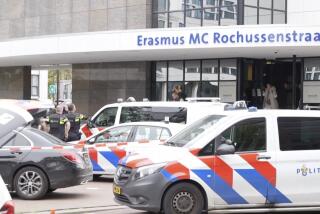Dutchman in Product Dispute Takes Hostages, Kills Himself
- Share via
AMSTERDAM — A gunman upset with the quality of wide-screen television grabbed as many as 18 hostages Monday in the tallest building in the Dutch capital, then shot and killed himself after a seven-hour siege, authorities said.
The hostages were freed unharmed, along with the more than 200 people who were trapped in their offices. The gunman’s identity was not released.
“At first I thought it was a joke,” said Mark Herveys, an employee of one of the 56 companies in the 35-story Rembrandt Tower. He said the gunman grabbed him as he came through the door, stuck a gun in his chest and told him to stand with other hostages.
Dist. Atty. Leo de Wit described the gunman as “mentally confused” and said he shot himself twice in the head.
Armed with two guns and explosives, the man seized control of the building in a protest against the Philips Electronics company, which he complained failed to live up to its advertised promises.
The gunman entered the building, where Philips was headquartered until last year, shortly after most of its businesses opened for the day. He took people in the crowded lobby hostage and never left the lobby level.
Herveys said he and a few others slipped out a back door when the gunman was distracted, after they had been held for about 20 minutes.
De Wit said a professional negotiator spoke with the gunman, who was demanding media exposure for his complaints. After several hours, the man told police he wanted to think about presenting more demands. He then went into a restroom and shot himself.
In a statement faxed from the office tower to state-financed NOS television, the gunman complained that consumers were being misled about the quality of the product.
The statement reproduced parts of six letters of complaint previously sent to a Dutch newspaper and the Consumer Board.
Ewald van Kouwen, spokesman for the Consumer Board, said the public body had several contacts with the man, whom he refused to name.
“We dealt with him like hundreds of thousands of other callers. We weren’t threatened, and there was no reason for us to contact the police,” he said.
More to Read
Sign up for Essential California
The most important California stories and recommendations in your inbox every morning.
You may occasionally receive promotional content from the Los Angeles Times.












